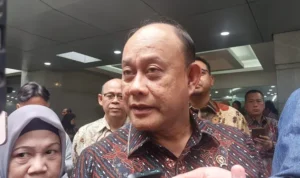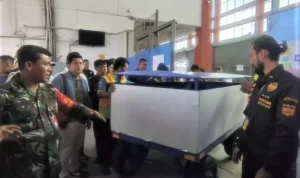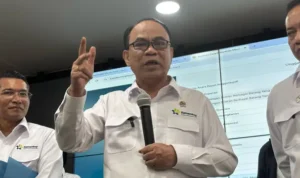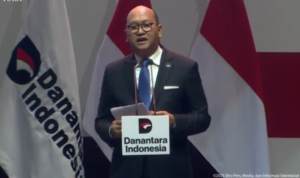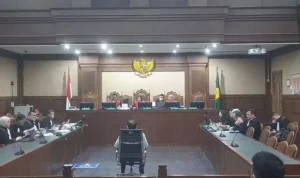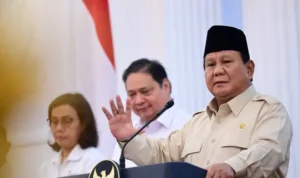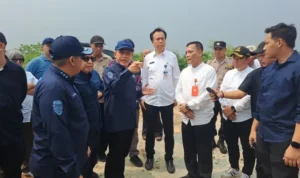INDONESIAUPDATES.COM, News En – A total of 46 Indonesian Migrant Workers (PMI) suspected of being victims of human trafficking (TPPO) in Myanmar were successfully repatriated to Indonesia on February 20, 2025, marking a significant achievement in the ongoing battle against human trafficking.
Human Trafficking Victims Return Home
The migrant workers, who had endured exploitation and torture, were flown back to Soekarno-Hatta International Airport in Tangerang, Banten, through a two-stage repatriation process. The operation was carried out using flights from Batik Air (ID7630) and AirAsia (QZ257), which arrived at 23:55 WIB and 00:10 WIB, respectively.
Judha Nugraha, Director of Indonesian Citizen Protection and BHI Ministry of Foreign Affairs, emphasized the importance of international cooperation in ensuring the safe return of these victims. “We have successfully repatriated 46 migrant workers from Myawaddy, Myanmar, thanks to the excellent cooperation between the Indonesian Embassy (KBRI) and relevant agencies,” said Nugraha.
Where Are the Victims From?
The 46 Indonesian workers repatriated from Myanmar come from various regions, with the highest number hailing from North Sumatra and West Java provinces. Other regions represented include North Sulawesi, Jakarta, and several others. These individuals were lured by promises of work abroad but found themselves trapped in exploitative conditions in Myanmar.
The Involvement of Indonesian Government Agencies
The Indonesian government, led by the Ministry of Foreign Affairs, continues its efforts to protect its citizens abroad. Nugraha added that there are still approximately 270 Indonesian nationals remaining in Myawaddy, Myanmar, with plans for their repatriation underway. “We hope to bring them home soon and continue our investigation into the parties responsible for this trafficking network,” he said.
In addition to the migrant workers, one of the individuals returned was a former member of the Indramayu DPRD (Regional People’s Representative Council), identified by the initials (R). This case highlights the far-reaching impact of human trafficking, which has affected individuals from all walks of life in Indonesia.
A Collaborative Effort to End Human Trafficking
The repatriation was part of a broader strategy to combat human trafficking and human rights abuses in Southeast Asia. The Indonesian government’s efforts have been recognized as an essential step in bringing justice to victims, with a focus on prosecuting those responsible for trafficking and exploitation.
Government’s Post-Repatriation Plan for Victims
After arrival in Indonesia, the Ministry of Social Affairs will oversee the assessment and care of the repatriated workers. This includes social reintegration programs and support for those affected by trauma. Once the initial process is complete, the workers will be returned to their home provinces for further care.
The Road Ahead: Combating Human Trafficking
Indonesia remains committed to fighting human trafficking both at home and abroad. With a growing number of Indonesian nationals falling prey to these illegal networks, the government is intensifying its efforts to raise awareness, provide assistance, and ensure that traffickers face legal consequences. The recent repatriation of 46 migrant workers is a testament to the effectiveness of international collaboration and the commitment of Indonesia’s government to safeguarding its citizens.
Key Takeaways:
- 46 Indonesian migrant workers were successfully repatriated from Myanmar after being exploited and trafficked.
- The repatriation process involved coordination between the Indonesian government, the Indonesian Embassy in Myanmar, and airlines such as Batik Air and AirAsia.
- The workers primarily came from North Sumatra and West Java.
- The Indonesian government is investigating the trafficking networks and providing support to the victims.
- More efforts are underway to repatriate 270 other Indonesian nationals currently in Myanmar.
FAQ: Indonesian Migrant Workers Repatriated from Myanmar
1. What happened to the 46 Indonesian Migrant Workers?
The 46 Indonesian Migrant Workers (PMI) were victims of human trafficking and exploitation in Myanmar. They were repatriated to Indonesia on February 20, 2025, following an extensive effort by the Indonesian government and international agencies.
2. How were the victims repatriated to Indonesia?
The repatriation process took place in two stages, with two flights: Batik Air (ID7630) and AirAsia (QZ257). The flights arrived at Soekarno-Hatta International Airport in Tangerang, Banten, at 23:55 WIB and 00:10 WIB, respectively.
3. Where did the repatriated workers come from?
The 46 repatriated workers hailed from several provinces in Indonesia, with the largest numbers coming from North Sumatra and West Java. Other regions included North Sulawesi, Jakarta, and other parts of the country.
4. Were there any notable individuals among the repatriated workers?
Yes, one of the repatriated individuals was a former member of the Indramayu DPRD (Regional People’s Representative Council), identified by the initials (R). This case illustrates the widespread impact of human trafficking.
5. How is the Indonesian government supporting the repatriated workers?
The Ministry of Social Affairs will conduct assessments and provide support for the victims. This includes social reintegration programs to help the workers recover from the trauma and difficulties they faced during their exploitation.
6. Are there more Indonesian nationals in Myanmar?
Yes, as of the latest reports, around 270 Indonesian nationals remain in Myawaddy, Myanmar. The Indonesian government is working on repatriating them as soon as possible.
7. What is the Indonesian government’s plan to combat human trafficking?
The Indonesian government is committed to investigating trafficking networks and holding perpetrators accountable. This includes ongoing efforts to protect Indonesian citizens abroad, raise awareness about trafficking risks, and provide support for victims upon their return.
8. What can the public do to help combat human trafficking?
Raising awareness about human trafficking risks, reporting suspicious activities, and supporting government efforts in combating trafficking are vital steps. Individuals should be cautious when seeking overseas employment and make sure to follow legal and safe migration processes.
9. How can I get involved in supporting the victims of human trafficking?
Organizations working in the field of human rights and trafficking prevention often accept donations, volunteers, and supporters. You can research and get involved with NGOs or government programs aimed at providing rehabilitation and legal assistance for trafficking victims.
FOLLOW INDONESIAUPDATES.COM ON GOOGLE NEWS


